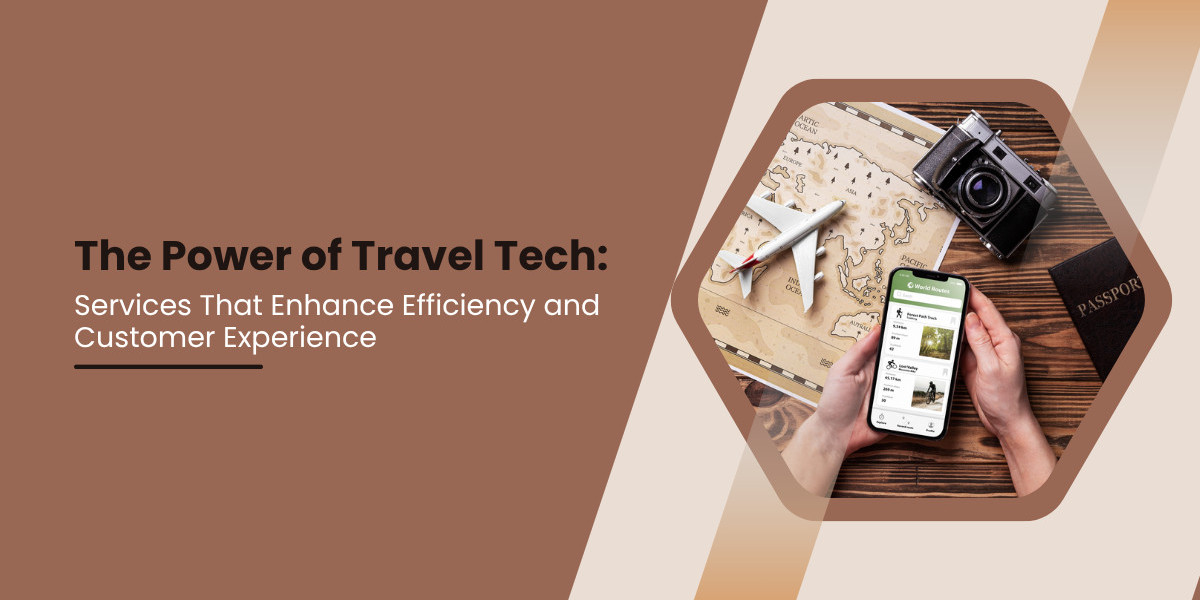The travel industry has evolved significantly with the integration of technology. According to Statista, the global market for travel technology reached $9.8 billion in 2024 and is projected to grow to $34.6 billion by 2033. Mobile travel apps alone recorded over 4.2 billion downloads, and 63% of travelers now prefer to use digital tools to plan and book their trips. These numbers indicate that travel businesses are rapidly adopting Travel Technology Services & Solutions to improve efficiency and customer satisfaction.
Core Components of Travel Technology
Booking and Reservation Systems
At the heart of travel technology lies the booking engine. These systems integrate with Global Distribution Systems (GDS) such as Amadeus or Sabre and facilitate real-time inventory updates. The architecture is typically built using RESTful APIs and supports millions of queries per second.
Advanced engines also handle dynamic pricing. These pricing tools use algorithms that assess demand, historical data, weather conditions, and competitor pricing. Airlines and hotels can update fares and availability in real time, increasing their yield while offering timely deals to customers.
Data Synchronization and Real-Time Processing
Modern travel systems operate with data flowing from multiple sources: airlines, hotels, payment providers, and weather systems. Event-driven architecture using tools like Apache Kafka helps maintain this real-time sync. Data consistency is critical, especially during peak travel periods when delays or cancellations occur.
Real-time processing ensures that updates reach users promptly. For example, if a flight delay occurs, the app notifies the traveler and may automatically rebook the flight or suggest alternate options.
Improving Efficiency Through Automation
Automation plays a central role in travel tech. It reduces operational costs and enhances service speed.
One key area is airport automation. Self-check-in kiosks, biometric boarding gates, and e-passport scanning systems reduce human involvement and waiting times. According to IATA, biometric boarding has reduced boarding times by 30–50% in several pilot programs.
In hotels, digital check-in via mobile apps allows guests to bypass front desk lines. Guests can use their phones as room keys, and AI-powered systems handle housekeeping requests or room upgrades.
Travel businesses also automate internal workflows. Back-office systems automatically reconcile bookings with financial systems, reducing manual errors and workload.
Enhancing Customer Experience with Personalization
Personalization is one of the most valuable outcomes of travel technology. Machine learning algorithms assess user behavior, preferences, and past bookings to offer targeted suggestions.
For instance, if a user frequently books beach destinations, the system might suggest tropical getaways during the summer. These recommendations are powered by collaborative filtering and deep learning models.
Chatbots are another important tool. AI chat assistants can handle bookings, rebooking, cancellations, and answer common queries 24/7. These systems are trained on customer service transcripts and use NLP models for accurate communication. Data shows that AI-driven chatbots now resolve over 75% of traveler inquiries without human intervention.
Integration of Travel Technology Services & Solutions
Frontend and Backend Alignment
A complete travel tech solution includes both a customer-facing frontend and a complex backend. The frontend must be responsive and accessible across devices. It should provide fast access to bookings, loyalty points, and itinerary changes.
The backend handles user data, inventory, pricing, and third-party APIs. Technologies often used here include:
Node.js or Java for server logic
PostgreSQL or MongoDB for data storage
Redis for caching
Elasticsearch for fast search queries
These services are containerized using Docker and deployed on cloud platforms such as AWS, Azure, or GCP. Kubernetes ensures high availability and load balancing.
Security and Compliance
Security is critical in travel platforms due to the sensitivity of user data. Systems use HTTPS, OAuth2.0 for authentication, and encrypted storage for payment details. Compliance with regulations like PCI-DSS and GDPR is mandatory.
Travel portals also perform continuous vulnerability testing. Code scanning tools are integrated into CI/CD pipelines, and firewalls monitor suspicious activity in real time.
AI in Route Optimization and Disruption Management
AI has changed how routes and disruptions are handled. For example, flight planning systems now use weather data, aircraft performance metrics, and air traffic data to optimize routes. This can lead to fuel savings and lower CO2 emissions.
AI also helps manage disruptions. If a traveler misses a connecting flight, the system can suggest alternatives based on real-time availability and user preferences. These systems use constraint-satisfaction algorithms to balance costs, timing, and convenience.
Use Case: Hotel Industry Transformation
A major hotel chain implemented IoT and AI to monitor energy use and reduce food waste. Smart thermostats adjusted room temperatures based on occupancy. Kitchen waste sensors analyzed food discarded at buffets and optimized menu planning.
In one year, the hotel reduced food waste by over 1,100 tons, saving costs and contributing to sustainability goals.
Also Read: B2B Travel Technology: Empowering Agents, Aggregators & Operators
Use Case: Airline Passenger Experience
An airline integrated a custom travel app with biometric verification, real-time alerts, and loyalty program data. Upon arrival at the airport, passengers received gate and terminal information along with updates on lounge availability.
The system also allowed boarding via facial recognition, which sped up the boarding process by 35%. Passenger satisfaction increased, and staff workload decreased.
Data Analytics and Business Intelligence
Data collected from travel apps, booking systems, and user feedback is used to make informed business decisions. Business intelligence dashboards track KPIs like average booking value, conversion rates, and cancellation trends.
Predictive analytics can forecast high-demand periods, helping travel providers allocate resources efficiently. These insights also help with targeted marketing, improving customer retention.
Sustainability Through Technology
Sustainability is a growing concern in travel. Many travel technology services now include tools to help users make eco-friendly choices. Apps display CO2 emissions for flights and offer train alternatives where possible.
Hotels use smart energy systems that track and reduce electricity and water usage. Digital receipts and virtual check-ins reduce paper use, contributing to greener operations.
AI systems also calculate optimal flight altitudes and paths to reduce the formation of contrails ice clouds that contribute to global warming. According to climate studies, avoiding contrails can reduce aviation’s climate impact by up to 35%.
Challenges in Implementing Travel Tech
Despite its benefits, deploying travel tech comes with challenges.
Integration complexity: Different providers use varied APIs and data formats. Middleware and API gateways are essential to maintain communication.
Legacy systems: Older travel companies often have legacy infrastructure. Migration to cloud-based microservices requires careful planning and testing.
Data quality: Inaccurate or outdated data can mislead AI systems and damage user trust.
User adoption: Some travelers prefer traditional methods. A gradual transition plan, including tutorials and hybrid options, helps improve adoption rates.
Future Outlook for Travel Technology Services & Solutions
As technology advances, we can expect:
Voice-enabled travel assistants integrated with smart speakers and apps.
Blockchain use in loyalty points, identity verification, and secure payments.
Augmented reality features for virtual hotel tours and airport navigation.
More personalized trips through deeper AI integration and larger datasets.
The role of Travel Technology Services & Solutions will expand beyond bookings. They will serve as the core infrastructure of travel companies managing logistics, sustainability, and customer engagement.
Conclusion
The growth of digital travel is undeniable. Businesses that adopt modern Travel Technology Services & Solutions gain faster systems, lower operational costs, and happier customers. These technologies improve how people travel from booking and check-in to sustainability and real-time support.
To stay competitive, travel companies must embrace this shift. Building a tech-driven operation is not optional, it's essential for long-term success in the modern travel landscape.








